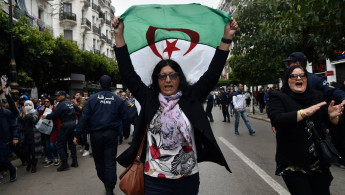'He burnt my future': Algerian activists blame patriarchy for surge of femicides
In Algeria, Ryma Anane, a 28-year-old French teacher, was burnt alive at the end of September on her way back home by a man whom she refused to marry.
"In Algeria, a woman is like an object. She has no right to refuse a man's request. The moment she does she must be punished," Anissa Smati, an Algerian lawyer and activist in the women's rights NGO Reseau Wassila, said to The New Arab.
On October 14, Ryma was transferred to Spain to be treated for her severe injuries. Her family said her last words before fainting in pain were, "He burnt me. He burnt my future."
Two weeks later, Maazouza Lwatia, known as Amina, a 26-year-old Algerian nurse, was killed by her sister's husband.
On October 24, Fatima Hamzi, 74, was killed by her son who was abusing her on a daily basis.
Under the Arabic Hashtag, "We lost one of us," the Facebook page of "Féminicides Algérie" posts a new femicide incident in the North African state where patriarchy reigns supreme almost every week.
So far, thirty-four Algerian women have been killed in 2022.
Algerian women's rights activists say those numbers are merely the tip of the iceberg of a deeply patriarchal social and legal system.
"This is happening in Algeria not because we are an Arab or Islamic country, but because as most countries in the world, we have patriarchal legal procedures and social concepts that do not help women to escape abuse," Smati told TNA.
To this day, the traditional social construct in Algeria remains predominant, making society relatively conservative and maintaining a substantial gender gap.
The Algerian Family Code imposes living conditions on women that impede equality, as it still considers the husband as the guardian of the family with the polygamy right preserved to him.
Bowing to the feminist movement, the Algerian legislature put in place a law criminalising domestic violence in 2015. This law made assaulting a spouse punishable by up to 20 years in prison for injuries and a life sentence for injuries resulting in death (Article 266 bis).
However, for several reasons, this law has failed so far to fully protect women.
The 2015 law applies only to spouses and ex-spouses living in the same or separate residences but does not apply to relatives, unmarried couples, or other members of the household.
"If you go to the police station as a victim of abuse they will most likely try to talk you out of putting a complaint and convince you to forgive the abuser," the Algerian lawyer added during her interview with TNA.
Smati noted that many of the victims who try to break the cycle and escape their abuser's house, who in most cases are their husbands, often face alienation and shame from families and relatives.
"Except in a few cases, most victims find themselves outcast by their families, without a refugee, especially if they don’t have the means to afford their own place," the Algerian lawyer added.
At present, there are only two national state-run shelters and five temporary accommodation centres devoted to victims of gender-based violence in Algeria.
Facing the lack of shelters and a budget devoted to gender-based violence in the country, Smati proposes that abusers should be the ones forced out of the household.
"[In case of an abusive husband] the legislator should permit the victim to stay in the household, while the abuser must be forced to get the punishment and the help he needs," she opined.





 Follow the Middle East's top stories in English at The New Arab on Google News
Follow the Middle East's top stories in English at The New Arab on Google News


